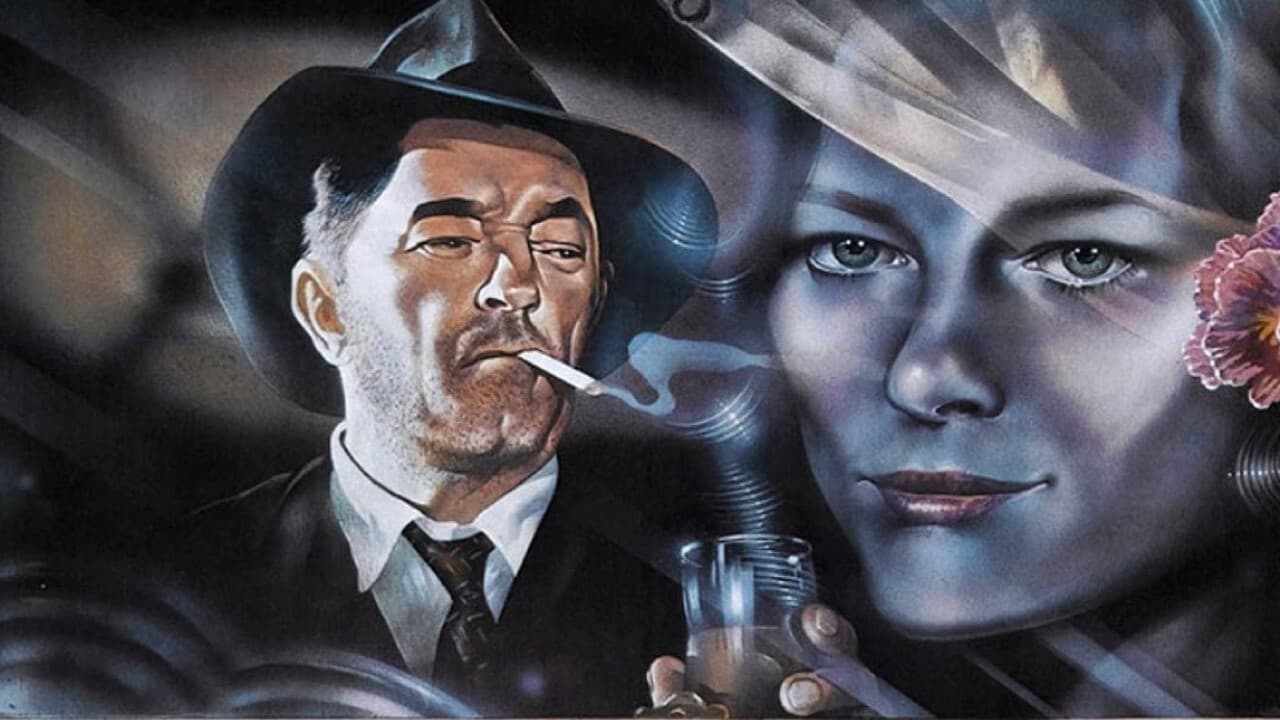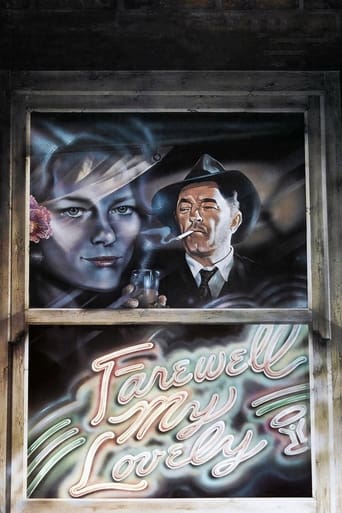



just watch it!
Too much about the plot just didn't add up, the writing was bad, some of the scenes were cringey and awkward,
View MoreThe plot isn't so bad, but the pace of storytelling is too slow which makes people bored. Certain moments are so obvious and unnecessary for the main plot. I would've fast-forwarded those moments if it was an online streaming. The ending looks like implying a sequel, not sure if this movie will get one
View MoreThere are moments that feel comical, some horrific, and some downright inspiring but the tonal shifts hardly matter as the end results come to a film that's perfect for this time.
View MoreRobert Mitchum was a bit long in the tooth when he played Philip Marlowe in this deliberately artificial remake of "Farewell, My Lovely" which, by the mid-seventies, seemed incongruously like a fish out of water. Despite an excellent cast that included Charlotte Rampling, John Ireland, Harry Dean Stanton, an Oscar-nominated Sylvia Miles and, in his only acting role, the novelist Jim Thompson the film looked and sounded like something of a museum piece. Maybe it needed someone other than the merely workmanlike Dick Richards to breathe some life into it in the way Altman did with the vastly superior "The Long Goodbye". When set beside Polanski's "Chinatown", which appeared the following year, or even the original 1944 version of the same story, this is decidedly second-rate; a fancy dress parade of character actors in search of a story.
View More"Farewell My lovely" is a pretty good take on Raymond Chandler's novel, and Robert Mitchum makes a great screen Marlowe; he's a little older and a little more weather-beaten than Bogart in the role. Interestingly, Chandler always thought Cary Grant would have been the right choice for the part - who'd have thought? Set around 1940, Marlowe gets involved in two cases that eventually join together. Moose Malloy, played by ex-heavyweight boxer Jack O'Halloran, hires him to find Velma, the girlfriend he hasn't seen in seven years - he's been 'in the can'.Marlowe is also hired to find jewellery belonging to rich old Judge Grayle (Jim Thompson) and his sexy young wife Helen (Charlotte Rampling). The body count mounts as the strands come together and Marlowe expounds his world-weary philosophies on just about everything. The film is peppered with characters that have been dealt a bad hand by life, but they are people Marlowe relates to.It was uncomfortable to get on the wrong side of Mitchum. He seemed to have built in radar that detected any kind of pretence and his comments in an interview with Roger Ebert about the director of the film, Dick Richards, were harsh.He also didn't seem to feel the mystique of Charlotte Rampling, dismissing her, according to Lee Server's biography of Mitchum, as "the chick who did the S&M movie 'The Night Porter'". However Charlotte Rampling, clothed and styled to recall Lauren Bacall, brings an enigmatic quality to her role, the camera loves her in her few short scenes.The film has a similar retro feel to "Chinatown". Both had great scores, and David Shire didn't spare the alto sax creating an evocative work to rival Jerry Goldsmith.Marlowe as played by Mitchum is a guy who knows deep truths about human nature; he's been knocked around and has felt pain - he understands you even if he has to shoot you. It's a quality that works well in this 40-year old movie.
View MoreI like Humphrey Bogart and Dick Powell's takes on Philip Marlowe, but to me, they weren't really Marlowe. Marlow had a brooding, poetic quality; he was a guy who would start out the window with a drink in his hand contemplating the mess that is humanity. Bogart and Powell did stop and think, they ran around and did stuff, and both were closer in spirit to Sam Spade.Then I saw Robert Mitchum in Farewell My Lovely, and I thought, "that's it." That's Marlowe, the tired, tough but run-down knight-in-rusty- armor. The slow, sensuous music, the harsh glare of neon, are exactly what I had in my head every time I read a Raymond Chandler novel. Mitchum (who when promoting the film suggested people watch it "if it's a hot day and the theater is air conditioned," is strong in a cast of actors who perfectly capture the feel of run-down, 1940s Los Angeles. Charlotte Rampling is an excellent femme fatale, Sylvia Miles is a persuasive drunk, and there's a small, wonderful performance by Kate Murtagh, who seems to have primarily just done guest spots in TV series (and been the Waitress for Supertramp's Breakfast in America).I recall being really excited when The Big Sleep came out, eager for another chance to see Mitchum do Marlowe, but alas, it was terrible, so this may well be the only movie that will ever capture Chandler as I want to see him.
View MoreEverything about this movie works just as it should, and that is pretty rare in a crime thriller. The earlier version, Murder My Sweet (1945), was the first screen incarnation of Chandler's timeless hard-boiled tough guy Marlowe, but 30 years of 're-visioning' the character put him increasingly out of touch with the times and resulted in Robert Altman's unrecognizable mumbling and fumbling Marlowe in The Long Goodbye (1973). Sensibly, the producers here turned the calendar back to the 1940s. Long night scenes give it all a nice noir look and threw in lots of classic noir visuals, such as slightly high angle shots early in every scene, with pools of lamplight on the ground like dissecting lamps, which have the audience looking down on the characters like specimens. Lovely. Robert Mitchum, looking world-weary but dogged, is perfectly cast as Marlowe, and the frosty Charlotte Rampling is a perfect deep frozen noir femme in the tradition of Bacall and Lake. They both perfectly inhabit the period and reel off Chandler's famous crackling dialogue like it's their natural speech. It gets almost too stylized at times, but everything works so well for the most part that the audience doesn't mind the contrivance. Marlowe belongs in the 40s and this may be a somewhat artificial version of those days, but I liked it.
View More